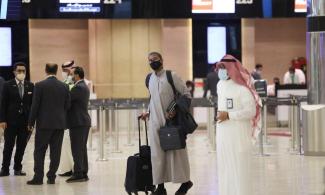
The announcement is the first to be reported in the Arab world.
Saudi Arabia has confirmed the discovery of the new coronavirus variant, Omicron in the country.
The announcement is the first to be reported in the Arab world.

The case was detected in a Saudi man who returned from an undisclosed North African nation.
This was made known by a Health Ministry Official as quoted by the State news agency, SPA.
Saudi Arabia had banned flights to and from several African countries.
Recall that Omicron was first reported on November 24 from South Africa, where infections have risen steeply.
It has since spread to more than a dozen countries, many of which have imposed travel restrictions to try to seal themselves off.
Meanwhile, the World Health Organisation (WHO) said the recently discovered and heavily mutated Omicron COVID-19 variant is likely to spread internationally.
The organisation said on Monday, that the new variant poses a very high risk of infection surges that could have “severe consequences” in some places.
Reuters reports that no Omicron-linked deaths had yet been reported, though further research was needed to assess its potential to resist vaccines and immunity induced by previous infections.
Anticipating increased case numbers as the variant, first reported last week spreads, the United Nations agency urged its 194 member-states to accelerate vaccination of high-priority groups.
“Omicron has an unprecedented number of spike mutations, some of which are concerning for their potential impact on the trajectory of the pandemic,” the WHO said.
“The overall global risk is assessed as very high.”
The WHO Director-General Tedros, Adhanom Ghebreyesus, said Omicron’s emergence showed how “perilous and precarious” the situation was.
“Omicron demonstrates just why the world needs a new accord on pandemics,” he told the start of an assembly of health ministers expected to launch negotiations on such an agreement.”
The WHO reiterated that, pending further advice, countries should use a “risk-based approach to adjust international travel measures”, while acknowledging that a rise in coronavirus cases might lead to higher morbidity and mortality rates.
“The impact on vulnerable populations would be substantial, particularly in countries with low vaccination coverage,” it added.